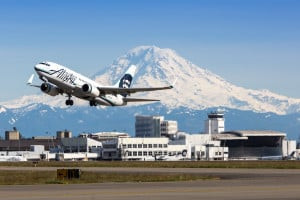Seattle-Tacoma International Airport (Sea-Tac) has bloomed this year as a bumper cherry harvest and increasing seafood shipments have helped drive tonnage.
In the first half of 2017, volumes were up 19.6 per cent as it absorbs additional capacity from four new services added in 2016 and embarks on a potentially record-breaking cherry export season.
Cargo operations manager, Tom Green says the gateway expects lower rates of growth in the second half of 2017, but he forecasts overall growth could be in excess of 10 per cent for the year, on the 366,000 tonnes in 2016.
He notes overall, domestic growth has outperformed international, but it has seen a slight uptick in Europe traffic through June, and Asia has been flat year-over-year, but July was strong to Asia with the cherry season still in progress.
Sea-Tac’s main focus lanes through its belly and freighter connections are Asia but also Europe and the Middle East while perishables and e-commerce have performed the strongest.

Green says the airport plans on growing further by leveraging facility renovation and expansion to attract more airline capacity growth.
Washington state cherries are boosting cargo volumes and Green says it has seen significant growth and intends to support an expanding industry seeing increasing harvest levels as they pursue new international markets.
In July, Sea-Tac recorded 230 international freighter operations and the total average monthly freighter activity during its peak cherry season has increased in excess of 20 per cent due to the influx of the international operations above its strong year-round domestic activity.
In 2016, DHL, Prime Air for Amazon, Aerologic and AirBridgeCargo Airlines were welcomed on the freighter side with Xiamen Airlines and Virgin Atlantic on the belly side.
Green says returning seasonal charter operations include Asian carriers China Cargo Airlines, Nippon Cargo Airlines and All Nippon Airways while in 2017 it also received a new freighter service from Yangtze River Express.
Sea-Tac welcomed a specially painted cherry themed Boeing 777 Freighter named ‘The Cherry Express’ on 24 July transporting the fruit to Asia by China Cargo Airlines.

He explains Sea-Tac will invest more into air cargo: “The airport is working to complete a current Master Planning exercise regarding airfield facilities.
“Seeing significant off-airfield facility development including Des Moines Creek Business Park and temperature-controlled facility development in Burien, both anticipating future development phases.”
As for the airfreight market in the US in general, Green says there is continued strength and growth potential, especially with e-commerce, but he feels Sea-Tac must continue to grow its offering to tap into opportunities. “Facilities capacity must be increased and modernised along with having one of the smallest footprints of any major US airport, which make space an even greater premium,” he adds.
Sea-Tac saw cargo surge for the fifth consecutive year in 2016 as it handled 366,000 tonnes – an increase of 10.2 per cent on 2015 tonnage levels.
Domestic airfreight shot up 20 per cent to 194,754 tonnes last year as the gateway became the first in the US to welcome Prime Air.


